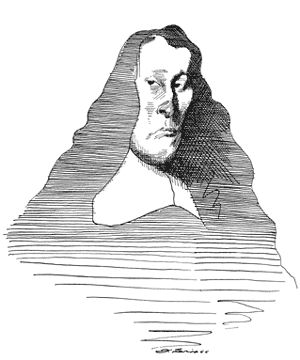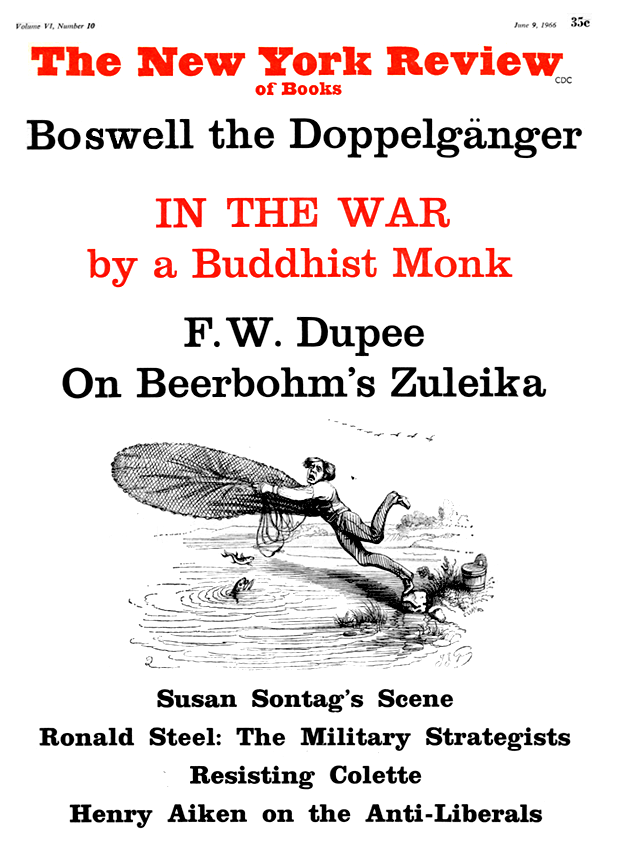“The literati,” says Douglas Bush with something of a tremor, “have not for decades granted Milton a place in the canon of poets who minister to our needs.” An overstatement, of course—Miltonists like Cleanth Brooks, William Empson, C. S. Lewis, and Northrop Frye are scarcely illiterati. But it brings out that Milton has (all along) been the most controversial poet in English. Of all the needs to which he ministers, the greatest is our need to commit ourselves in passionate argument about literature. Not as part of the academic industry, but because literature is the supreme controversy concerning “the best that has been thought and said in the world.” By the energy and sincerity of his poetry, Milton stands—as no other poet quite does—in heartening and necessary opposition to all aestheticisms, old and new.
“Poems should not mean but be”? “Words alone are certain good”? Not for Milton, though his are certainly good. His moral and intellectual commitment to literature as argument, his anti-aestheticism, comes the more powerfully from one whose poetry lacks none of the subtlety, suppleness, and formality of patterning which aestheticism rightly relishes. So that we can push “our needs” back a stage—Milton ministers superbly to our need to comprehend how variously magnificent and strange the English language is, how finely it can communicate what we wish to say, how dextrously it can help us to discover what we wish to say. Milton’s mastery of language fortifies not merely our sense of what is beautiful, but our sense of what is human.
Yet this, in some degree, must be true of all good poets. What is more immediately true of Milton is that he leaves his readers no choice but to commit themselves with their minds and hearts. To stand up and be counted—all the more important when so much poetry leaves us “stretched on the rack of a too easy chair.” When Professor Bush says of “Lycidas,” “Milton is wrestling with Job’s question: why should the just man suffer?” the word wrestling (which is altogether right for Milton) serves to remind us of our commonplace suspicions: that the wrestling is all fixed, that the antagonists are going through the motions. Not only in literature itself, but also in our tussle with it. Faked wrestling, shadowboxing. Lionel Trilling has wittily said about modern criticism: “Attributing to literature virtually angelic powers, it has passed the word to the readers of literature that the one thing you do not do when you meet an angel is wrestle with him.” But the over-polite word cannot be passed to readers of Milton—not even the most arid of Miltonists has been able to make Milton safe for pedagogocracy.
MILTON ENGAGES, he even makes you give yourself away. Which is why the criticism of him is so freshly infuriating. What in other contexts would be irrelevant autobiographical eruptions are the very stuff of the argument. Professor Bush can snort that however well Milton might have presented his God, He “would still be antipathetic to an age that has changed ‘sinful’ to ‘antisocial’.” But the snort is to the point—the way we live now is something that cannot be kept out of the terms of discussion, and that is why Milton’s greatness resembles that of another fiery and searching moralist: D. H. Lawrence. Moments of decision for the writer and the reader: “Under which king, Bezonian—speak or die.”
For Empson (as for me), Christianity is “a system of torture-worship.” For Bush, it is an “all-embracing creed of liberty and discipline.” It is Paradise Lost which can bring together, in a relevant argument, two such views, and can do so without succumbing either to a rarefied aestheticism (beauty, not beliefs) or to a rarefied theologizing (beliefs, not beauty).
And not just the religious and moral issues, whose formulation (whether you are a Christian or not) is impossible to ignore in Paradise Lost where they “rape the mind and will not be unimagined.” Again like Lawrence, Milton makes us give ourselves away on the most intimate and secretive of matters. That is why one can even forgive Professor Jackson Cope, who has said of Adam and Eve: “Their sexuality is condoned in the bower scenes of Book IV.” Condoned! Milton, without bluster or blinking, has given us some of the greatest and most mature erotic poetry in the language. Still, in a way it is a tribute to Milton—it brings out how Milton searches you out and knows you. And to return to “our needs”: one of the most obvious is for an erotic poetry which will not sell short our summer and autumn, marriage and maturity, in the interests of the spring, youthfulness, “the poor benefit of a bewildering minute.”
To claim that Milton is our greatest poet of married love might excite an obvious retort (how many others are there?), and yet even that scarcity must surely make Milton’s achievements—especially Adam and Eve’s forgiveness in Book X of Paradise Lost—not less but more valuable. One reviewer has declared himself pained by Professor Bush’s wounding asides about John Donne, but again, however tendentious, they are apt pointers to the true terms on which Paradise Lost “ministers to our needs.” Donne’s love poetry is great and is not narrow, but nothing in it comes within light years of the particular gravity and maturity of the best of Milton’s love poetry.
Advertisement
In the same way, Milton’s determination not to permit any dichotomy between body and spirit has meaning, an insight, and a humanity which go far beyond “the seventeenth-century world-picture.” Body and spirit are both matter; there was sexual intercourse before the Fall; the body is not inherently degrading and was not the prime degrader: These may all seem to be battles long ago, victories that have been so assuredly won that we can now do without Milton. We can’t. The morbidly high-minded, the poor in spirit we have always with us—and the decent sanity of Milton is still a vital force, the more vital because no one can accuse Milton of having sold out to godless materialism or carnality.
Likewise the devastating anti-heroics of Paradise Lost. A more telling exposé of the cruel falsities of a dictatorial heroism has never been written. As many critics have said, Satan’s rally is a fascist rally. But fascism will never be a thing of the past. We may for the moment have passed beyond Carlyle’s dangerous credulity but the time will never come when it will be wise to dispense with Milton. So delicate in portraying true heroism, so rich in creating the glamor of Satanic heroism, and so lethal in judging it.
THE LAST OF “OUR NEEDS” (last here, not the last available in Milton’s multifariousness) can be approached via a fine but perilous formulation in Northrop Frye’s The Return of Eden. He distinguishes two creative temperaments: the conservative and the radical or revolutionary. The distinction is delicately and memorably made: “In listening to the Kyrie of the Bach B minor Mass we feel what amazing things the fugue can do; in listening to the finale of Beethoven’s Opus 106, we feel what amazing things can be done with the fugue.” Lovely. But then to pigeon-hole Milton along with the revolutionaries does him less than justice. He belongs with Shakespeare and Wordsworth precisely because his writing so transcendently balances both the conservative and the revolutionary. In one artistic lifetime, he was both historian and explorer. Of all our writers, he pays the most sincere respect to classical literature, and at the same time he makes it tauntingly new; the epic becomes the anti-epic.
Surely, to adapt Mr. Frye’s words, in reading Milton we feel very powerfully both “what amazing things the English language can do,” and “what amazing things can be done with the English language.” What is at issue is something more than the height of Milton’s pedestal, since the literature of our own day has tended to value the revolutionary at the expense of the conservative. The writer whom T.S. Eliot called, “outside the theatre, our greatest master of freedom within form” made no such mistake.
THE THREE PRESENT BOOKS minister in different ways. Professor Bush’s “sketch” of Milton’s life and writings is explicitly an introduction—brief, shrewd, and with a settled wisdom which is needling as only a settled wisdom can be. Professor Frye’s essays were also “conceived as an introduction for relatively inexperienced students,” but they clearly expect more. This is not Frye the myth critic (the archetypal force of so much in Paradise Lost is allowed to speak for itself), but Frye the expositor—patient, lucid, and deftly informative on a thousand topics. Very wittily frank, almost too much so since the wit will stay uneasily in the mind when the qualifying context has dimmed. Of the historical prophecy at the end of Paradise Lost: “It is intended to be consoling, although Adam collapses twice under the ordeal of being consoled.” Of the Chorus in Samson Agonistes: “standing and uttering timid complacencies in teeth-loosening doggerel.” Of Christ in Paradise Regained: “a householder dealing with an importunate salesman.”
MRS. LEWALSKI’S STUDY of “the genre, meaning, and art of Paradise Regained” is an impressive work of scholarship. It scrupulously brings together the historical evidence as to precisely what a “brief epic” was; it scrutinizes Milton’s religious beliefs with acumen and expertise; and it offers a new understanding of the typological schemes in the poem. The “art”? Those who believe they could show that by and large the poem is wordy and slovenly in style will not be convinced by Mrs. Lewalski’s account of its “precision” and “economy.” And those who think that the important and insistent parallels with Job were imprudent, at a time when Milton was less than his best, will not be convinced either.
Advertisement
At one point Mrs. Lewalski says that Milton seems to have accepted the view that Job was perfect, his “complaints” altogether sinless. But in her conclusion, she claims that Milton’s Christ “overmatched” Job in that he did not give vent to complaints. To me, as this glissade suggests, Milton never satisfactorily established the superiority of his Christ to the Job whom he continually invoked. But this is an important, an indispensable, book.
And the continuing debate? Well, naturally, none of these books seems to me to deal persuasively with the age-old problems in Milton that have by no means been settled. Milton’s God? Professor Bush concedes that some complaints against Him are “perhaps legitimate,” but says no more about them, and certainly does not really consider to what extent even a slight defect here might wreak havoc with the moral and religious meaning of the poem. For Professor Frye, “There is nothing to be done with this objectionable creature except swallow him.” Or spit him out, presumably. As to the essential argument about the counter-claims on Adam (his love for Eve vs. “higher claims”), in neither Bush nor Frye is it satisfactorily known that these higher claims are truly embodied in the poem itself. It is all very well to claim that we must disapprove of Adam because we know that on certain occasions there are higher claims. What has to be shown is that here, in the poem itself, there is a convincing embodiment of those higher claims. Before we can weigh man’s love in the scales with God’s love, God’s love has to be as truly present—as it is in the poetry of George Herbert. And to that demonstration neither Bush nor Frye really addresses himself. No doubt we are all liable to offer reassurances when we ought to offer arguments, but this matters very much when the poet is one who is so argumentative as Milton.
This Issue
June 9, 1966



